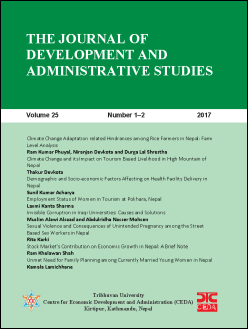Determinants of Informal Employment and Wage Differential in Nepal
DOI:
https://doi.org/10.3126/jodas.v22i1-2.13463Keywords:
Determinants of informality, informal employment, wage differentialAbstract
Wage discrimination in formal and informal sectors is one of the pressing issues that might perpetuate uneven livelihood options and human capital formation at household level. This paper analyzes on what determines whether a person works in informal sector. It also gauzes the degree of wage discrimination in formal and informal sectors in Nepal using country representative labor force survey based cross-section data produced by ILO in 2008. It is found that the gender, geography, educational status, marital status, age of the employee and ethnicity of the employee definitely matter whether an individual works in informal or formal sector. These variables need to be considered while formulating social security policies. Since the wages for relatively educated workers are significantly low in informal sector than formal one, it demands a suitable policy intervention to check probable working poverty in Nepal.
The Journal of Development and Administrative Studies, Vol. 22, No. 1-2, pp. 37-50, 2014
Downloads
Downloads
Published
How to Cite
Issue
Section
License
The copyright of the accepted articles is reserved by the Centre for Economic Development and Administration (CEDA), Tribhuvan University (TU). No part of the article published in this journal should be reproduced except provided by the law currently in force without the written consent of the centre.




